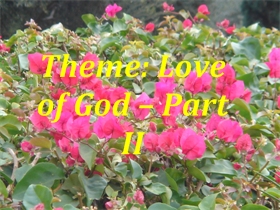Faith, like
knowledge and love, is the foundation of human existence. Without it, life is
not worth much. When we climb to the highest rung on the ladder of faith—faith
in God—a metamorphosis takes place just like a caterpillar transforms into a
beautiful monarch butterfly. But for the soul, hanging on to the cord of
steadfastness is not easy. There is a steep penalty to pay in losing faith in
God—in not reaching the “blissful abode.”
How do we manage this risk?
Devotion
That the divers communions of the earth, and the manifold systems of religious belief, should never be allowed to foster the feelings of animosity among men, is, in this Day, of the essence of the Faith of God and His Religion. (Baha'u'llah, Epistle to the Son of the Wolf, p. 13) |
The voice of the true Faith calleth aloud, at this moment, and saith: O people! Verily, the Day is come, and My Lord hath made Me to shine forth with a light whose splendor hath eclipsed the suns of utterance. Fear ye the Merciful, and be not of them that have gone astray." (Baha'u'llah, Epistle to the Son of the Wolf, p. 29) |
Deeper Learning
Regarding the spirit of faith, Abdu’l-Baha said:
“…the magnet of faith and service
is the manifested loving power of the spirit of faith. It allows one to attract
the divine virtues and to experience spiritual happiness. The key is a life of
faith. We must endeavor to know ourselves, for within each of us lies mysteries
of existence. Then, we can enter the Kingdom revealed and feel the healing warmth
of the Sun of Reality.”
In this brief excerpt, there are many important points to
consider. Two of them are attraction to divine virtues and spiritual happiness,
both of which are themes that we’ll regularly visit as part of our series of
presentations. The third is faith, the understanding and growth of which is of
the highest importance as it is the path that leads us to virtues and
happiness.
What is faith? If you ask several people, you will get many
different answers depending on experience, age, belief and knowledge. Let’s go
through some of the more common understandings of faith. There is no doubt that
faith is the foundation of life–but as we go through the various ways of seeing
faith, make sure to reflect on your own system of belief. Through it,
self-knowledge will certainly grow, as promised in the previous quotations, and
serve as a way to discover the mysteries enshrined within each of us. Faith is
like a compass that guides a wise spiritual traveler on the path of
self-discovery, and with every awesome insight that the soul receives it inches
closer to paradise.
Faith has many meanings and definitions. And we’ll review four of them:
To some faith is confidence or trust in a person or thing.
The earliest experience of trust in a human takes place during the first few
days of life. The newborn immediately senses the love of the mother and starts
to trust her. Have you noticed that in crisis—it could be pain, hunger or
fear—where a newborn first turns for comfort? It’s always the mother’s arm and
no one else. When faith in the mother grows, then the young one is able to
trust others. This relationship is extended to others such as the father and
siblings. When this faith does not exist, what happens? One becomes reclusive,
shy and hopeless. Just like oxygen and water are essentials for physical
existence, our emotional existence needs faith. Just imagine parents and
children living with little or no faith among each other. This unit will surely
collapse into a dysfunctional family. Lately in the world, since the summer of
2011we have seen fighting in the Middle East, protests in Europe and riots in
England, the causes of all of them are attributed to lack of faith in our
political leaders. Faith comes from knowledge and trust (a derivative of love),
both of which are building blocks for proper functioning of an individual as
well as families, society and the world. For example, would you allow a surgeon
to give you a heart transplant when you know that he has botched up many other surgeries?
Will a construction worker climb up a scaffold knowing that it is unsafe?
Obviously, the answer to both is ”no.” Faith is fundamental for the survival of
anyone whether she a toddle or the most brilliant scientist.
Another kind faith is in a code of ethics. This is common in
businesses where a person or group that maintains certain behaviors and sense
of integrity.
The third is a system of religious belief, such Baha’i
Faith, Hindu Faith or Jewish Faith. Many belong to these religions without
awareness of God. It is possible as I was one of them. In numerous cases, belonging
to these organizations provide comfort, a sense of belonging or because their
parents were of that faith.
The fourth kind of faith is a belief system that is not
proof-based, for example, acceptance of a Creator, whom no one else has seen.
This faith is born out of an intimate relationship between the soul and the
Holy Spirit as discussed before. As it grows, so do ones inner powers. Let’s
look deeper into this faith.
Reflection
Have you ever thought of what it is like to be truly happy?
How happiness and faith tied together?
Deeds (path of service)
Strive thou,
that haply thou mayest achieve a deed the fragrance of which shall never fade
from the earth. (Baha'u'llah, Epistle to the Son of the Wolf, p. 115)
What that
deed could be? Just “a deed” could leave an everlasting footprint in this
material world. What a wonderful thought!!!
Post links are:


